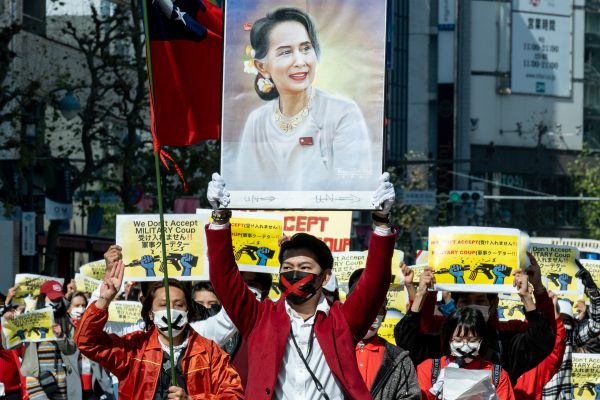Former vice president Myint Swe — now serving as President — used his constitutional authority to declare the state of emergency, then transferred state power to the Commander-in-Chief of the Myanmar Armed Forces (Tatmadaw), Min Aung Hlaing.
The Tatmadaw claimed that widespread election fraud in the November 2020 elections resulted in the NLD landslide victory. On 2 February 2021, they announced that a new State Administrative Council had been formed to take over all state legislative, judicial and executive functions. This has been called a coup by most Western media.
After 10 years of varying levels of cooperation between the Tatmadaw and the NLD, the democratic transition has taken a serious U-turn. But given the strained relations between the Tatmadaw and the NLD — and given the fragility of all democratic transitions — the potential for such a reversal was always there, lingering in the shadows.
Most Western governments and media outlets were quick to denounce and condemn the Tatmadaw and tried to draw attention to what they saw as a slow and weak response from the Japanese government. Certainly, Japan was not included in the 15 February statement by ambassadors to Myanmar that called for the military to show restraint and condemned the detention of political leaders.
But Japan was a signatory to the G7 Foreign Minister’s statement on 3 February, ‘condemning the military coup’. On 21 February and again on 28 February, the Japanese government said it ‘strongly condemned’ the situation in Myanmar. In the same statement it said, ‘the government of Japan once again strongly urges the Myanmar military to release those who are detained … and swiftly restore Myanmar’s democratic political system’.
Leaving aside Western governments’ failures to facilitate positive change in Myanmar — and ignoring the high probability that they are merely appealing to domestic activist stakeholders at a relatively low political cost — Japan’s different approach to the coup in Myanmar does raise questions.
The day after the Tatmadaw took power, Japan’s State Minister of Defence Yasuhide Nakayama told Reuters, ‘If we do not approach this well, Myanmar could grow further away from politically free democratic nations and join the league of China’. This reveals the Japanese government’s understanding of the geostrategic significance of Myanmar in the region.
China’s increasing influence in Myanmar has long been a concern for Japanese leaders. Fear over increasing dependence on China was one of the factors that led to the Tatmadaw deciding to initiate political reforms and open up Myanmar in 2011. The government of Japan was instrumental in this process, facilitating re-engagement between the international community and the government of Myanmar.
On the condition that democratisation proceeded, Japan cancelled much of Myanmar’s outstanding debt in 2012. But more importantly perhaps, Japan provided a bridge loan to Myanmar to enable it to clear its arrears with the World Bank and the Asian Development Bank in the same year. This allowed these financial institutions to begin development aid and support the democratic transition of then-president Thein Sein.
Japan’s diplomacy should also be viewed within the framework of relations with ASEAN, a key strategic partner for Japan. Tokyo has spent decades investing in the stability and prosperity of Southeast Asian countries and Japan’s economy is heavily dependent on them. On 10 February there was a phone call between the foreign ministers of Japan and Indonesia, with the main issues discussed being the situation in Myanmar and issues related to the South China Sea and the East China Sea. For Japan — and for ASEAN alike — these issues are all linked.
The Japanese government’s approach to the coup in Myanmar is in some ways a middle road between the ‘distant’ Western states that prioritise human rights and democracy and the ‘local’ Asian states that prioritise stability and development. In this way, Japan is treading a fine line between its position as a liberal democracy and its dependence on stability and development in Southeast Asia. The overriding international concern for all states in Southeast Asia is China’s rise and responses to the coup in Myanmar are best understood within that framework.
Patrick Strefford is Professor of International Relations at Kyoto Sangyo University.


Thanks for pointing out the condemnations which Japan issued in February. These have gotten no coverage in the media in the USA where I live.
Thanks, too, for pointing out that Japan, and other Asian democracies, is trying to balance its needs for trade and stability with its principles of democracy and human rights. Its relative proximity compared to the USA and Europe admittedly make that more challenging.
But hundreds of people have lost their lives in Myanmar. And thousands are in prison. At what point do these humanitarian issues take precedence over trade and ‘stability?!?’ Some pundits are waiting to see if the upcoming ASEAN meeting will move things in a better direction. I am less hopeful given ASEAN’s history of treading very lightly when conflict arises. What will Japan, as well as S Korea, Indonesia, Singapore do in the event that ASEAN does not take a strong stance on these events in Myanmar?